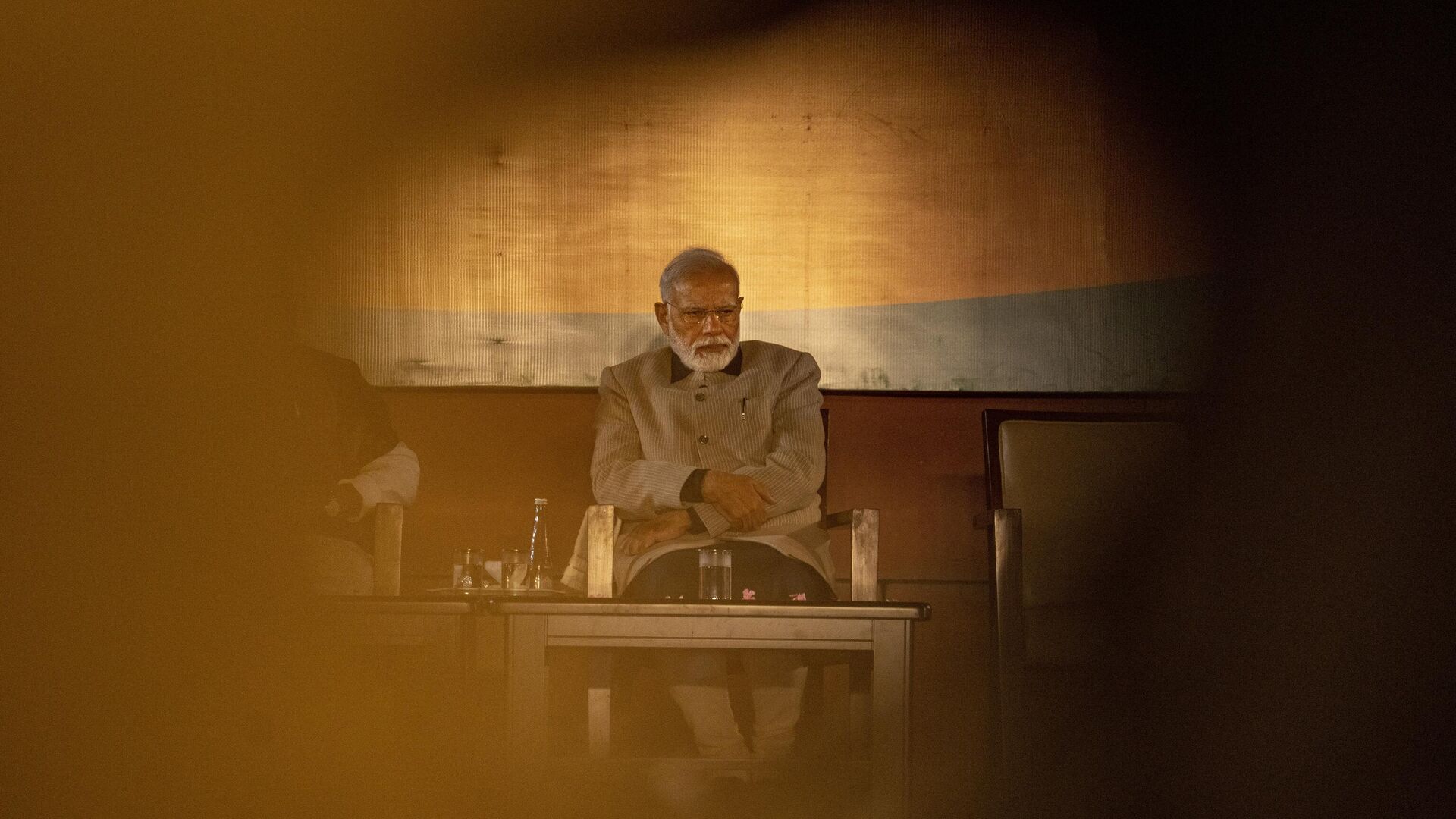https://sputniknews.in/20230124/attempt-to-pressure-india-experts-weigh-in-on-controversial-bbc-documentary-616672.html
Attempt to Pressure India? Experts Weigh In on Controversial BBC Documentary
Attempt to Pressure India? Experts Weigh In on Controversial BBC Documentary
Sputnik India
BBC documentary on Prime Minister Modi's role during 2002 Gujarat riots has erupted a debate across the platform on western media vendetta against the South Asian nations.
2023-01-24T18:33+0530
2023-01-24T18:33+0530
2023-01-24T18:55+0530
sputnik opinion
india
narendra modi
russia
gujarat
2002 gujarat riots
bbc
https://cdn1.img.sputniknews.in/img/07e7/01/17/597611_0:160:3073:1888_1920x0_80_0_0_b8cd693db12b07d2b329981ae19dcc40.jpg
The 59-minute BBC documentary "India: The Modi on the Gujarat riots of 2002" topped international headlines last week, prompting politicians and diplomats to weigh in on the debate.When social unrest rocked the Indian region of Gujarat, the now-PM Narendra Modi served as state chief in his home state.BBC Pursuing Outdated AllegationsThe Gujarat riots broke out after 58 Hindu pilgrims were charred to death when their train's coach went up in flames at Godhra railway station in Panchmahal district on February 27. Local Muslims were blamed for the crime.Soon, the confrontations grew to communal violence between the Hindus and Muslims, which lasted for at least three days. As per official figures, about 1,100 people died, most of them Muslims, while about 2,500 others were injured.Following the riots, a group of human rights activists and opposition leaders unanimously accused then-state chief Modi (and state police) of not doing enough to protect Muslims from Hindu mobs and tacitly "supporting" the radical sentiments.The allegations were rubbished by Modi and his Bharatiya Janata Party (BJP). Consequently, Modi received a clean chit from all the courts, including India's Supreme Court and special investigation teams following years-long probes. However, experts have questioned the timing of the damning documentary. This year, India presides over the G20, while important state elections are due to be held in nine states with the general election scheduled for 2024.Is India Paying the Price for Stance on Ukraine Conflict?Sputnik spoke with former journalist Shekhar Iyer, who questioned the documentary's content and said: "What new has [the] BBC explored in the documentary?"Iyer opined that the documentary is an indirect way for western corporations to pressurize India on certain issues, including Russia's special military operation in Ukraine."After India took a neutral stand on Russia's military operations in Ukraine and stood away from western countries on the matter, it seems many corporates and liberals are upset," Iyer said.New Delhi Labels BBC Documentary 'Propaganda'India banned the documentary on Sunday. However, its content, including short video excerpts, has been circulating on social media.Meanwhile, New Delhi has pointed to the colonial mindset behind material.Former diplomat Ashok Sajjanhar also questioned the selective picking of the event while making the documentary, describing the BBC as an openly "anti-India" lobby."First, the documentary fails to inform that a train was charred, which led to violence. Secondly, they fail to mention about [the] Supreme Court ruling, which freed Modi from all such charges," Sajjanhar said. On Monday, a joint statement by more than 300 former judges, bureaucrats, and prominent figures, including Sajjanhar, accused the BBC of pushing a British imperialist agenda and "setting itself up as both judge and jury to resurrect Hindu-Muslim tensions."Double Standards?Iyer similarly questioned the timing of the release."Narendra Modi's government is showcasing India as a soft power in G20. Now, a few corporations are trying to tarnish their image and want to raise human rights issues," Iyer stressed.Iyer and others also alleged that foreign media organizations seek to interfere with the Indian election. "These people were alleging that [Russian media] should not interfere with the US election. Now, what are they trying to do in India ?"
india
russia
gujarat
Sputnik India
feedback.hindi@sputniknews.com
+74956456601
MIA „Rossiya Segodnya“
2023
Deexa Khanduri
https://cdn1.img.sputniknews.in/img/07e6/0c/13/138923_52:0:533:481_100x100_80_0_0_cadf23d341691fc65ff2b22fd1afe584.jpg
Deexa Khanduri
https://cdn1.img.sputniknews.in/img/07e6/0c/13/138923_52:0:533:481_100x100_80_0_0_cadf23d341691fc65ff2b22fd1afe584.jpg
News
en_IN
Sputnik India
feedback.hindi@sputniknews.com
+74956456601
MIA „Rossiya Segodnya“
Sputnik India
feedback.hindi@sputniknews.com
+74956456601
MIA „Rossiya Segodnya“
Deexa Khanduri
https://cdn1.img.sputniknews.in/img/07e6/0c/13/138923_52:0:533:481_100x100_80_0_0_cadf23d341691fc65ff2b22fd1afe584.jpg
bbc documentary "india: the modi, gujarat riots 2002, bbc documentary, prime minister narendra modi,
bbc documentary "india: the modi, gujarat riots 2002, bbc documentary, prime minister narendra modi,
Attempt to Pressure India? Experts Weigh In on Controversial BBC Documentary
18:33 24.01.2023 (Updated: 18:55 24.01.2023) Deexa Khanduri
Sputnik correspondent
A BBC documentary about the 2002 Gujarat riots has sparked a heated debate on why western media is so eager to bash South Asia?
The 59-minute BBC documentary "India: The Modi on the Gujarat riots of 2002" topped international headlines last week, prompting politicians and diplomats to weigh in on the debate.
When social unrest rocked the Indian region of Gujarat, the now-PM Narendra Modi served as state chief in his home state.
BBC Pursuing Outdated Allegations
The Gujarat riots broke out after 58 Hindu pilgrims were charred to death when their train's coach went up in flames at Godhra railway station in Panchmahal district on February 27. Local Muslims were blamed for the crime.
Soon, the confrontations grew to communal violence between the Hindus and Muslims, which lasted for at least three days. As per official figures, about 1,100 people died, most of them Muslims, while about 2,500 others were injured.
Following the riots, a group of human rights activists and opposition leaders unanimously accused then-state chief Modi (and state police) of not doing enough to protect Muslims from Hindu mobs and tacitly "supporting" the radical sentiments.
The allegations were rubbished by Modi and his Bharatiya Janata Party (BJP).
Consequently, Modi received a clean chit from all the courts, including India's Supreme Court and special investigation teams following years-long probes.
However, experts have questioned the timing of the damning documentary. This year, India presides over the G20, while important state elections are due to be held in nine states with the general election scheduled for 2024.
Is India Paying the Price for Stance on Ukraine Conflict?
Sputnik spoke with former journalist Shekhar Iyer, who questioned the documentary's content and said: "What new has [the] BBC explored in the documentary?"
"Whatever the BBC has presented in the documentary is already out in media, and India's top court has examined those facts."
Iyer opined that the documentary is an indirect way for western corporations to pressurize India on certain issues, including Russia's special military operation in Ukraine.
"After India took a neutral stand on Russia's military operations in Ukraine and stood away from western countries on the matter, it seems many corporates and liberals are upset," Iyer said.
"Moreover, now that Indian defense strategy and foreign policies are taking an independent approach, many corporates, companies, who sponsor these organizations want to pressurize India to change our stand on the matter," Iyer stated.
New Delhi Labels BBC Documentary 'Propaganda'
India
banned the documentary on Sunday. However, its content, including short video excerpts, has been circulating on social media.
Meanwhile, New Delhi has pointed to the colonial mindset behind material.
"The bias and lack of objectivity and frankly continuing colonial mindset are blatantly visible," Indian External Affairs Ministry's spokesperson Arindam Bagchi remarked. "A propaganda piece designed to push a particular discredited narrative," the Indian government further said.
Former diplomat Ashok Sajjanhar also questioned the selective picking of the event while making the documentary, describing the BBC as an openly "anti-India" lobby.
"First, the documentary fails to inform that a train was charred, which led to violence. Secondly, they fail to mention about [the] Supreme Court ruling, which freed Modi from all such charges," Sajjanhar said.
On Monday, a joint statement by more than 300 former judges, bureaucrats, and prominent figures, including Sajjanhar, accused the BBC of pushing a British imperialist agenda and "setting itself up as both judge and jury to resurrect Hindu-Muslim tensions."
"When India's Hindu and Muslim have accepted the wound of the 2002 riot, what's the business of BBC to rake up the communal issue out of nowhere?"
Iyer similarly questioned the timing of the release.
"Narendra Modi's government is showcasing India as a soft power in G20. Now, a few corporations are trying to tarnish their image and want to raise human rights issues," Iyer stressed.
Iyer and others also alleged that foreign media organizations seek to interfere with the Indian election.
"These people were alleging that [Russian media] should not interfere with the US election. Now, what are they trying to do in India ?"


